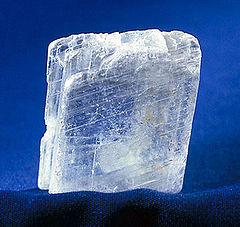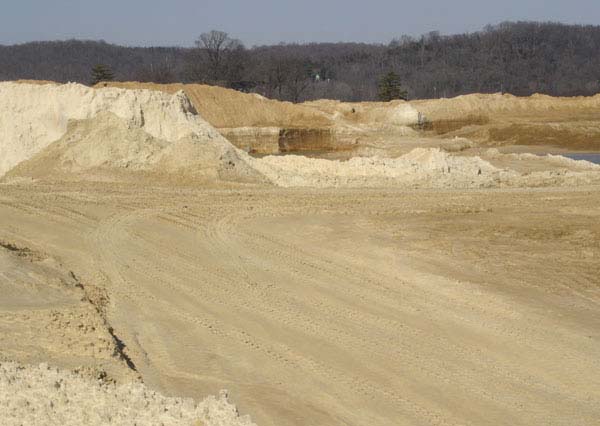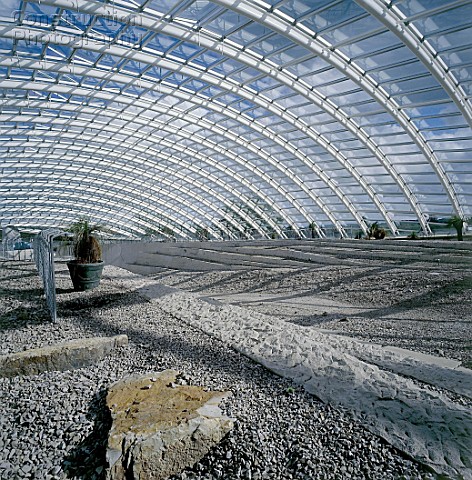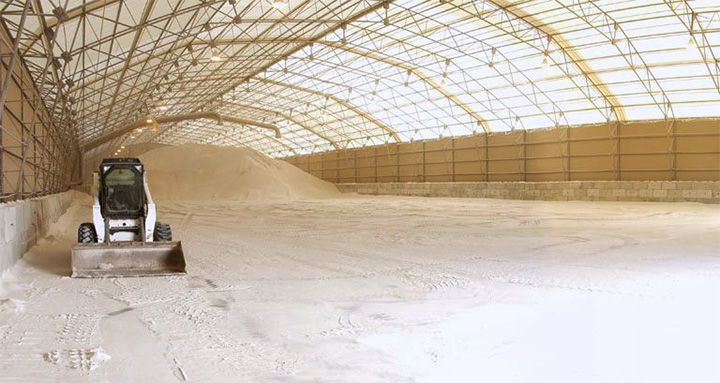Gypsum Storage 
A soft white or grey mineral consisting of hydrated calcium sulphate. It occurs chiefly in sedimentary deposits and is used to make plaster of Paris and fertilisers, and in the building industry. Gypsum, a white mineral soft enough to be scratched with a fingernail, is hydrated calcium sulphate [Ca(SO4) 2H2O]. Gypsum often begins as calcium sulphate dissolved in an isolated body of salt water. As the water evaporates, the calcium sulphate becomes so concentrated that it can no longer remain in solution and crystallises out (precipitates) as gypsum. Many large beds of gypsum have been formed in this way.
Gypsum occurs in a number of distinct forms, including a clear, parallelogram-shaped crystal (selenite); a white, amorphous form (alabaster, used for ornamental carving); and a fibrous, lustrous form (satin spar, used in jewellery). When ground up and heated to drive off its water, gypsum becomes a powder termed plaster of Paris. Plaster of Paris has the useful property of hardening in any desired shape when mixed with water, moulded, and allowed to dry.

Gypsum is one of the most widely used minerals in the world. Some 90 countries mine gypsum, producing more than 100 million tons (91 million metric tons) annually. The construction industry has long been particularly gypsum intensive. In the late nineteenth and early twentieth century’s gypsum was widely used in plastering, which since the 1950s has been displaced by gypsum drywall (sheetrock). Gypsum is also an ingredient in Portland cement, which used in the construction of bridges, buildings, highways and millions of tons of gypsum used annually as fertilizer. Small quantities of pure gypsum are essential in smelting, glassmaking, and other industries.
Low-grade gypsum is manufactured synthetically at coal-fired electric power plants as a by-product of pollution-control processes that remove sulfur from flue gas. Synthetic gypsum production exceeds 110 million tons (100 million metric tons) annually.
Gypsum Storage

We want to make storage easy for you; we proved long span steel structure for your gypsum pile
We would like to propose Large Span Steel Shed, which can be used to cover gypsum; it can built with a span of up to 150 m and height of up to 40 m.
Gypsum Storage Shed:
The construction systems uses mild steel in case of gypsum storage, no welding is required because the connection of the member consists of a very efficient moment-resistant mechanical joint. Gypsum storage shed may be built in single- or double-layer configurations, depending on the load and span. Experience suggests large spans are required in gypsum storage; a-double-layer is the most cost-effective
Gypsum storage sheds are often built over operating stockpiles since construction can proceed without interrupting operations. Because our erection process does not require machines to be installed internal periphery of the span.
Roofing of the structure:
Galvalume is typically use for roofing purpose, Galvalume is lustrous spangled appearance is attractive enough to be used without painting. The GALVALUME sheet is a unique product which is suitable for heating and ventilation applications. It has better resistance towards oxidation and can withstand temperatures up to 315°C without discoloration. This feature of Galvalume enables us to use on limestone shed for roofing purpose.
Key Features
- Smooth Surface and uniform spangled appearance
- Excellent quoting with anti-fingerprint to ensure better appearance and longer life
- Surface treatment as per ROHS (Restriction On Hazardous Substance) norms
- Wider thickness range with tighter tolerances to ensure precision in end-applications
Advantage of Gypsum storage shed:
- For achieving effective prevention and control of potential fugitive emission
- Lesser Operation and Maintenance cost
- Comply with current environmental guidelines by CPCB (Central Pollution control board)
- Protection from weird environmental condition
Conclusion:
Our Structure is fully Complying with new environmental regulations for air quality, Prevention and control of fugitive emission. Instead of investing in temporary solution, it is recommended to adopt permanent solution. Our solutions presented here not only allow affordable compliance, but also enhance the reputation of your plant. In addition, one time investment is much more economical than the periodic investments
Gypsum storage shed manufacturers in India who provide In-house Design Fabrication and Installation


